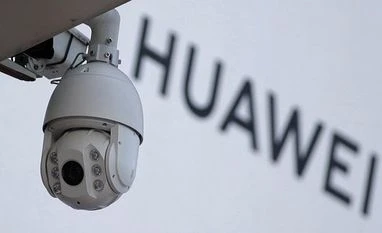A U.S. clampdown on exports to Huawei Technologies Co. threatens to disrupt the Chinese company’s access to critical suppliers across its businesses, from smartphones to 5G equipment—and Silicon Valley could share in the pain.
Huawei, the world’s leading telecommunications-gear supplier and No. 2 smartphone seller, relies heavily on the U.S. for many advanced components, including both semiconductors and software.
The Shenzhen-based company has said it spent about $11 billion on U.S. components last year out of a procurement budget of $70 billion. Experts said the impact of Washington’s move could extend as well to Huawei’s non-U. S. suppliers who deal in U.S. parts.
Huawei does business with Silicon Valley’s biggest names, including Qualcomm Inc. and Broadcom Inc. for smartphone chips, Intel Corp. for cellular-tower components, and Oracle Corp. for software. It also buys from many smaller technology suppliers spread across the country.
The Commerce Department on Wednesday said it would put Huawei and its affiliates on its “Entity List” on the grounds that the Chinese company had acted contrary to U.S. national security or foreign policy interest. The designation will force Huawei suppliers to apply for licenses in order to keep selling to the Chinese firm.
Huawei has long denied that the company and its equipment are at the disposal of the Chinese government, posing a security risk for other countries.
The measure’s full impact won’t be known until the Commerce Department publishes its full listing, and it isn’t clear how forthcoming export licenses will be. Such licenses can take weeks or months for approval, experts said, and even non-U. S. companies might have to apply to sell to Huawei if the goods contain U.S.-sourced components.
The restriction gives the U.S. wide latitude to disrupt Huawei’s supply chain and the Chinese company’s ability to sell products and service customer networks.
“The entity list addition is incredibly powerful,” said Chris Timura, an attorney specializing in international trade at law firm Gibson Dunn. “This is one large section in a wall that the U.S. government has been building around Huawei for the last couple of years,” he said.
Edison Lee, a telecom analyst at investment bank Jefferies, said in a report he doesn’t expect the U.S. to grant any such licenses.
In a statement, a Huawei spokesman said the company “will seek remedies immediately” to a move it warned would hurt more than Huawei. “It will do significant harm to the American companies with which Huawei does business.”
Huawei said it has been building up inventories in the past year as insurance against a U.S. supply disruption—an effort that ramped up as the U.S. squeezed Huawei and its chief Chinese rival, ZTE Corp. Equipment maker ZTE was brought to its knees last year after a similar Commerce Department action banned it for three months from buying U.S. goods after it violated an agreement resolving its earlier evasion of U.S. sanctions on North Korea.
Huawei also has been working to reduce its reliance on U.S. suppliers. It now makes many of its own advanced chips and has developed an operating system for its smartphones, which currently run on Google’s Android system. A Google spokesman didn’t immediately comment.
While Qualcomm’s regulatory filings show around two-thirds of the company’s revenue came from China last year, Huawei wasn’t among a small number of customers that accounted for more than 10% of its overall sales.
Qualcomm and Oracle declined to comment. Broadcom didn’t respond to a request for comment. An Intel spokesman confirmed the company is a Huawei supplier and declined to comment further.
The Commerce Department’s move comes as broader efforts to resolve U.S.-China trade tensions falter, and it could provoke retaliation by Beijing, which has protested what it sees as a U.S. campaign to hobble Huawei as a global technology provider.
Chinese Foreign Ministry spokesman Lu Kang said Thursday that Beijing opposed unilateral sanctions that “abuse” export controls, and that it would take measures to safeguard the interests of Chinese businesses.
The Commerce Department action was paired with a White House executive order seen as a precursor to a ban on selling Huawei-made products in the U.S. The order will have minimal impact on Huawei because its products are already effectively barred in the U.S., although the measure could provide a template to allies considering similar blacklists, a U.S. official said recently.
The export review process stands to deal a heavier blow to Huawei and its suppliers.
At a gathering in Shenzhen last year to honor Huawei’s major suppliers from around the world, the 33 U.S. companies outnumbered China’s 25, according to a rundown of 92 vendors published in state media.
Huawei’s smaller U.S. suppliers include Lumentum Holdings Inc., a producer of optical components for telecom equipment. The Milpitas, Calif., company didn’t immediately respond to a request for comment.
Others include two makers of chips called field programmable gate arrays, or FPGAs: Xilinx Inc., of San Jose, Calif., and Altera Corp., an Intel unit. FPGAs are crucial components in base stations, which connect devices like smartphones to wireless networks—and which Huawei makes.
A 2016 report by CCID, an official think tank in Beijing, listed U.S. companies that in the previous year sold chips to Huawei worth a total of $6 billion, including $560 million from Xilinx. A separate CCID report around that time said Xilinx was a lifeline for Chinese telecom and chip manufacturers, providing more than half of the FPGA chips used by Huawei and ZTE. More recent data wasn’t available.
Xilinx said it is aware of the likely U.S. actions and is evaluating the situation.
Unlock 30+ premium stories daily hand-picked by our editors, across devices on browser and app.
Pick your 5 favourite companies, get a daily email with all news updates on them.
Full access to our intuitive epaper - clip, save, share articles from any device; newspaper archives from 2006.
Preferential invites to Business Standard events.
Curated newsletters on markets, personal finance, policy & politics, start-ups, technology, and more.
)